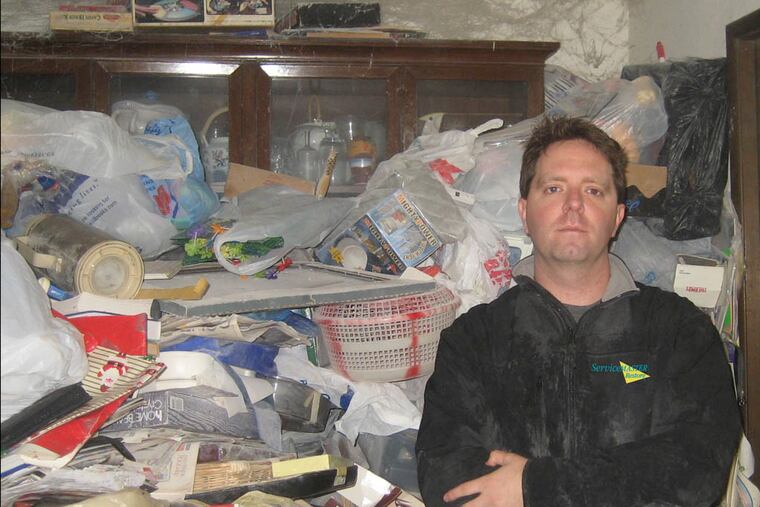Expert predicts more hoarders as baby boomers age
An aging population means plenty of work ahead for hoarding-cleanup expert Matt Paxton and his minions.

LOOKING TO get into a growth industry? Two words: hoarding cleanup.
"Grief and time is what causes hoarding," proclaimed Matt Paxton, during a recent visit to Philadelphia. "The elderly just happen to have more time."
And, one might argue, more reasons to grieve.
"Not all old people hoard . . . but the issue is, the population [of elderly] is getting ready to triple. In 30 years, 35 percent of the country will be over 65. We're gonna have more hoarders.
"In 20 years, I'm gonna have a bunch of Beanie Baby hoarders."
Paxton knows whereof he speaks. Thanks to his six-season run as star of the A&E reality series, "Hoarders," the Richmond, Va., native has been as responsible as anyone for putting the mental disorder in the spotlight.
Although his program was canceled last year (stream past episodes at aetv.com/hoarders), Paxton still devotes his life to helping the afflicted to rearrange their lives through his Richmond-based company, Clutter Cleaner.
He is currently barnstorming the nation speaking with mental-health and social-work professionals under the aegis of ServiceMASTER Restore, a nationwide franchise operation that specializes in extreme cleaning jobs, such as those seen on "Hoarders." He was in town recently to address a gathering at the Bellevue.
According to the American Psychiatric Association website, "People with hoarding disorder excessively save items that others may view as worthless, and have persistent difficulty getting rid of or parting with possessions, leading to clutter that disrupts their ability to use their living or work spaces."
About 2 percent to 5 percent of the population have the disorder, which "often leads to substantial distress and disability."
Paxton began his cleaning and restoration career after offering to clean out his grandmother's storage areas and discovering she was a hoarder. But he stressed that the condition is not exclusive to older people.
"We think that hoarders are 65-year-old white women with cats who have no money," he said during an interview. "That's not the case. Hoarding is about grief and time. Something tragic happens, and then time happens. We're seeing it in younger people."
That, he continued, means that hoarders aren't just accumulating mid-20th-century items.
"9/11 is my number-one trigger I get calls on," he said, referring to the 2001 terrorist attacks on the World Trade Center and Pentagon. "We had a whole house that was 9/11 paraphernalia. That was the trigger for this person."
Collector or hoarder?
A desire to acquire doesn't necessarily make someone a hoarder. The distinction between the two is clear, Paxton said.
"When collecting interferes with normal conduct of life, it becomes hoarding," he explained. "It's a really aggressive curve. [Hoarders] keep an average amount of stuff until that trigger - a death, the loss of a job, whatever. . . . That's when it starts to ramp up."
While some critics considered his TV show exploitative of mentally-ill people, Paxton views the program as having been something of a game-changer for those with the disorder.
"We had 10 people from a hoarder support group [at the seminar] today, raising their hands saying, 'I'm a hoarder,' " he said. "Two years ago, they never would have done that.
"People are more willing to come out now. It's not as embarrassing as it was. I think the show helped with that."
A change in perspective from the mental-health and insurance realms was another step forward, he said. "The [American Psychiatric Association] acknowledging it as a mental disorder has helped a ton. And insurance companies now are more willing to pay for treatment."
As bad as it looks
When Paxton describes what he does for a living, it almost sounds like he's auditioning for another reality-TV show, the Discovery Channel's "Dirty Jobs."
"Bedbugs are a major issue right now. They're worse than roaches, and roaches are horrific," he said in the same tone of voice he might use to order a cup of coffee.
"We had one house that had two feet of spider webs and the house was completely full of roaches. They would climb up into the spider webs and literally rain roaches on top of you."
He continued, "You have to be fully protected. We're in full Hazmat gear. You have to have your skin covered. The biggest issue is dead animals and urine and fecal matter. We find tons of fecal matter. We found 18,000 pounds of used adult diapers in a woman's house."
He wouldn't think of changing careers, though, he said.
"This may sound like hell, but this is the best job," he said. "I get paid to help people. It's better than a real job. I get a hug, and I get a check.
"And that's a pretty cool gig."